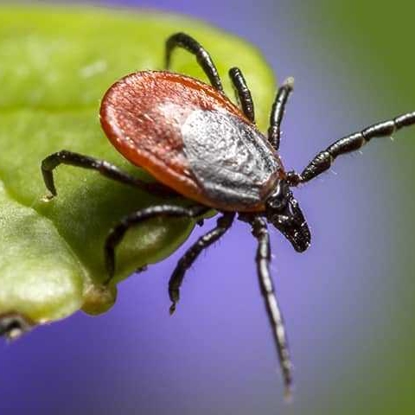
Ticks

About
What are ticks?
Ticks are arachnids, and adults have eight legs, are wingless, and have flat, oval bodies that are usually a combination of gray, white, black, or reddish-brown. Their sole source of nutrition comes from the blood of warm-blooded animals. After feeding, their bodies swell and become more rounded.
Some favorite tick hosts include dogs, cats, rodents, and wild animals. Ticks near your home are opportunistic and will feed on any animal (cat, dog, rodent, wild animal, or person) that brushes past them.
Are ticks dangerous?
Ticks are dangerous pests to have in our New York yards.
Ticks require a blood meal from a new host at each new life stage (larva, nymph, and adult). Ticks are slow efficient feeders making it easy for them to acquire and pass on diseases to their hosts, and the more ticks living in your yard, the more chance there is that you, your kids, or your pets will come into contact with them. While not every tick bite will transmit a tick-borne disease, The potential is there. In addition, tick bites create an opening in your skin that could develop into a secondary infection.
Avoiding contact with ticks is always best!
Why do I have a tick problem?
Ticks are outdoor pests, moving from place to place on the backs of their animal hosts. The more animal activity you have on your property, the more likely your outdoor space will be home to ticks. If your property is near wooded areas, fields, parks, or other outdoor areas with a lot of animal activity, you will likely experience recurring problems with ticks.
Where will I find ticks?
The tick’s eggs, larvae, and nymphs develop into new breeding adults in areas that provide them with moisture and shade. The soil under thick vegetation, areas of tall grass, and wooded areas are places where these pests thrive.
When ready to feed, a tick crawls to the top of a piece of grass or other vegetation where they wait for a host to brush past them that they can crawl on, attach themselves to, and feed on their blood. Ticks usually feed over several days; once full, they will fall to the ground below.
Ticks sometimes find their way into our homes, typically on the back of a pet or rodent. However, most tick species are unable to breed indoors and are usually not a problem inside houses and other structures.
How do I get rid of ticks?
Ticks are constantly being introduced onto our properties by neighborhood pets and wild animals. Controlling tick populations on your property is best done with regular home pest control services performed by a professional. We will help you solve your tick problem at All State Pest Control by performing seasonal treatments using eco-friendly products. Call today for more information about wildlife removal and tick control in Nassau or Suffolk Counties.
How can I prevent ticks in the future?
To help you reduce the chance of ticks taking over your Nassau or Suffolk County, NY yard, we have compiled a list of our most helpful tips:
- Keep your grass cut short and your yard free of weeds.
- Cut back grass from walkways, sidewalks, and fencelines.
- Cut back shrubbery from your home’s exterior.
- Remove wood piles, debris, and overgrown shrubbery that can provide a home for ticks and other pests.
- Remove things from your yard that will attract wild animals like bird feeders and uneaten pet food. Make sure lids are on trash cans and regularly harvest gardens.
- Seal holes in your home’s exterior to help keep tick-ridden rodents out of your house.